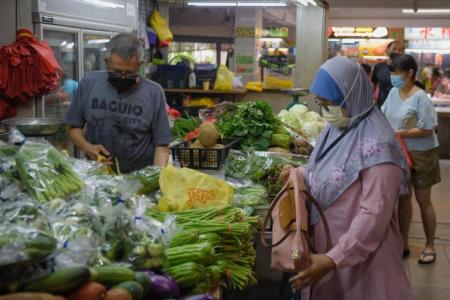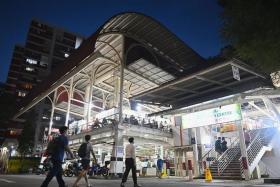Supply stable, but prices remain uneven for fish, vegetables
While floods have ravaged Malaysia, major retailers and industry players in Singapore said the overall supply of fish and vegetables here remains stable.
Price increases of vegetables, however, were uneven. The Straits Times visited four wet markets on Wednesday (Dec 22) and found that not all types of vegetables increased in price, and not all stalls raised prices.
For fish, industry players whom ST spoke to said they have observed price increases of between 20 per cent and 30 per cent. The factors they cited for the rise, however, differ. Singapore Fish Merchants' General Association said the rain causing floods in Malaysia have deterred fishermen from going out to sea, while Punggol Fish Merchants Association cited the usual year-end monsoon season for the price hike.
Mr Ang Jwee Herng, president of the Singapore Fish Merchants' General Association, said the floods resulted in a decreased supply of 20 to 30 per cent, making consumers paying more.
"Supply such as seabass, red snapper and golden pomfret, are not affected," he added.
Mr Daniel Pe, who chairs the Punggol Fish Merchants Association, said: "Nowadays, our sources are quite diverse, our supply won't be affected by a single source. There has been flooding in Malaysia almost every year, so this is expected."
Severe flooding in Malaysia over the weekend left 17 people dead and 66,000 people displaced as at Tuesday (Dec 21). About 64 per cent of the 80,434 tonnes of leafy vegetables Singapore imported last year came from Malaysia.
For wet market stallholders, their vegetable supplies have been cut. And despite cost price rising, they were hesitant to increase retail prices.
Mr Mic Ng, 42, who runs a vegetable stall at Clementi 448 Market and Food Centre, said 80 per cent of his supplier's spring onions got spoiled in the flood, pushing him to source from Thailand instead.
While the cost price of spring onions did not increase for Mr Ng, tomatoes from Malaysia have now doubled from $0.80 per kg to $1.95. This left him no choice but to pass on the cost to his customers at $2.50 per kilogram, up from $1.50 before.
The cost price for 5kg of chilli padi also doubled from $20 to $40, and Mr Ng had to sell it at $10 per kilogram, up from $7 before.
"I can't increase the price too much. If I did, I wouldn't have customers. So I'll settle for less profit margin," he said.
At Chong Pang Market and Food Centre, vegetable stallholders also faced decreased supplies.
Despite this, Madam Aw Beng Choo, 66, is not increasing her prices even though the floods affected her supply of vegetables.
"Now that business is so bad (because of the pandemic), how can we increase price? No one will want to come," she said.
A 48-year-old stallholder at Ghim Moh Road Market and Food Centre, who runs the business with her husband and wanted to be known only as Ms Zhang, said her supplier has increased prices by about 30 per cent.
Although half of the cherry tomatoes she ordered did not arrive due to the floods, she maintained prices at $6 to $7 per kg to retain her regular customers.
"Cherry tomatoes are highly sought after around the Christmas period, I cannot increase the price," she said.
But she raised prices by $1 to $2 for other vegetables such as Japanese cucumber, capsicum and romaine lettuce, as these supplies have dropped "slightly". Ms Zhang noted that prices and supplies have been fluctuating throughout the year.
She added: "There are even fewer customers this year, compared with the festive period last year. I'm exhausted from the ups and downs; if there are lesser supplies, we'll just sell less."
A vegetable stallholder at Nee Soon East N2 Market who wanted to be known only as Mr Jeya, 32, said his supplier also increased prices by 20 to 30 per cent.
"We absorbed some of the costs and (raised) retail prices by 10 per cent," he said.
"We are affected by the holiday season, not the Malaysia floods, because kids are free during the holidays and families cook less (and) they go out to eat."
Mr Jerry Tan, vice-secretary of the Singapore Fruits and Vegetables Importers and Exporters Association, did not observe supply disruption as their members source for vegetables from Johor and Cameron Highlands in Malaysia.
He explained: "Floods didn't affect our supply as those areas don't supply to us."
Supermarkets like FairPrice and Sheng Siong said they have not experienced a supply disruption to vegetables, eggs and poultry. A FairPrice spokesman said prices of food imports from Malaysia have remained stable.
"We will continue to monitor the situation closely and ensure that our customers have a stable supply of essential items at affordable prices," she said, adding that FairPrice also imports from over 100 countries.
Get The New Paper on your phone with the free TNP app. Download from the Apple App Store or Google Play Store now


